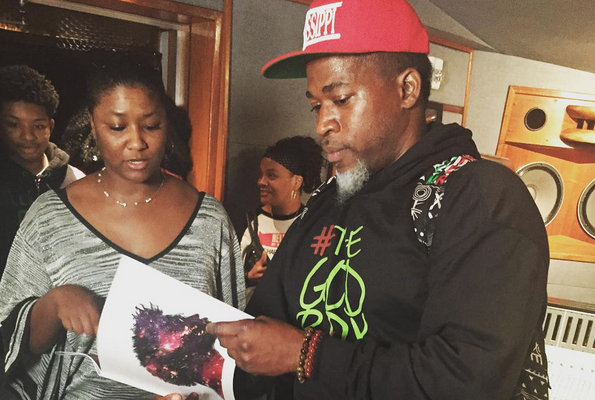At one point, David Banner was bopping his head so hard, I was sure–despite the fact that it was snugly pulled over a healthy head of hair–that his hat was going to violently tip over onto his laptop, and unfortunately disturb the medley of iPhone chargers, cups half-full of Hennessy, and The God Box booklets strewn across the studio console.
Last night, for an intimate crowd of writers, editors, interns, fans and friends, David Banner previewed his forthcoming 8th LP, The God Box, at Platinum Sound Recording Studios in Hell’s Kitchen. A bit flustered after rushing in from a flight–Banner told the story of how he hopped out of a cab and raced the final few blocks to Platinum Sound on foot, lugging cargo packed with “God Box” merch, still out of breath upon arrival–the Mississippi veteran, largely responsible for the continued exposure of some of today’s best and brightest Southern lyricists–Big K.R.I.T. being the best example of that–gave a brief insight into the mission he embarked on while creating The God Box, before diving, enthusiastically, into the album itself.
Though snippets aren’t available–at Banner’s request–all in attendance were treated to a The God Box booklet, sporting artwork from Banner’s trusted graphic artist, with whom he showered praise at several intervals, and the lyrics to every song on the album. On the LP’s opener, a bruising number titled “Evil Knieval,” Banner wasted no time making his political stance public knowledge, postulating that Obama’s voice has been muffled by the system he runs, but must also succumb to at times. The album flows sprightly, with few sonic hiccups, even when electric guitars littered with classic rock riffs give way to songs like “Cleopatra Jones,” a trap song aimed at giving Black women a guilty-free jam to party to.
Much can be said about Banner’s career to this point. During his introduction, he educated everyone in attendance about his supplemental work, which includes scoring movies and working on advertising campaigns with Gatorade, but even those impressive accomplishment pale in comparison–at least to rap fans–to what Banner’s done on wax, be it commercially with Chris Brown, or niche work with 9th Wonder. If artists careers are to be digested in stages, David Banner is on what can be considered his 3rd stage, and despite the absence of pop success and radio play at this current plateau, it may very well be his most interesting.
